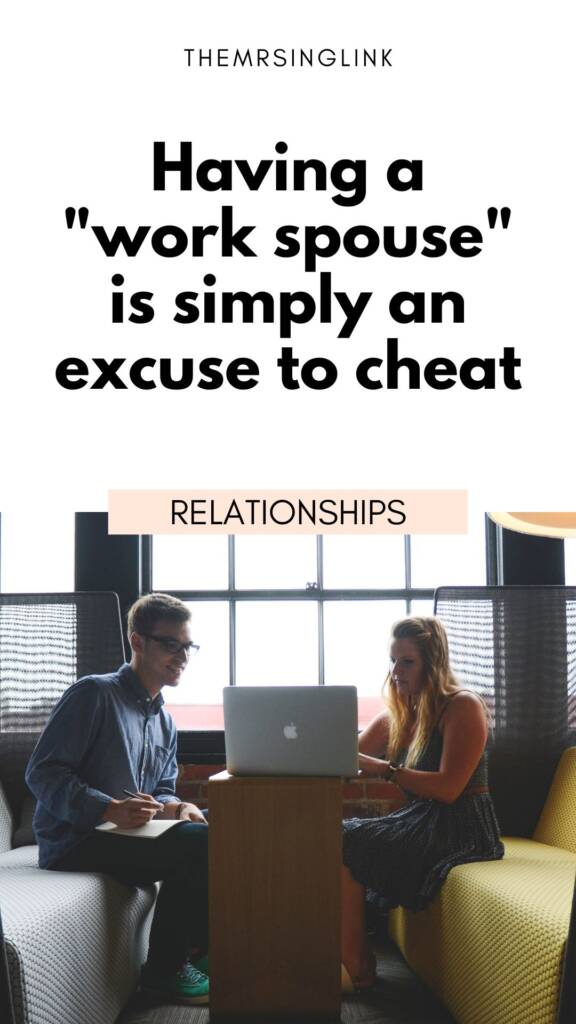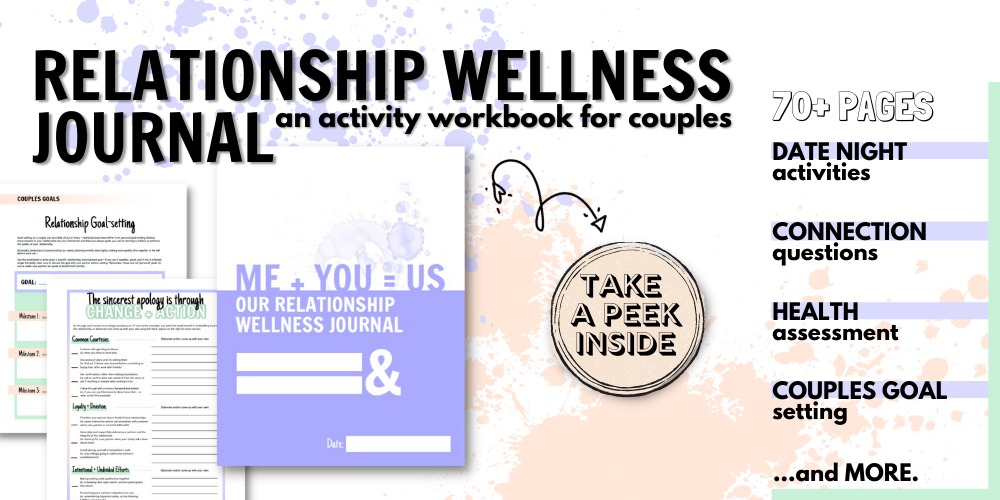Oope, did I stutter? Work spouses are for singles. And there’s no changing my mind on this one. Leave this glamorized – and, nowadays, normalized – workplace trend to the REAL single folks. Otherwise, yeahHH, having a work spouse is simply an excuse to cheat. You do realize emotional affairs are a legitimate thing, right?
Yet again, I’m about to trigger the steam from people’s ears with this one. But this just gets me so fired UP! It’s marriage we’re talking about, here – why are we downplaying THE most honest commitment two people can *promise* to one another???
I’m aware; those will want to cherry pick from this that I’m trying to say, “You can’t have work friends, or work relations with those of the opposite sex!” And no, that’s not what I’m saying. In fact, I do my very best to point out the differences between a “work friend” and this disgusting perversion of a work-friendship, “work spouse”, and why one can be considered a detriment to the integrity of a committed relationship. So hang tight.
The fairly recent rising of the terms “work wife” and “work husband” leaves me absolutely baffled, especially since there are those who won’t DARE define or label their romantic relationships to begin with, let alone can’t fathom acknowledging what it means to be MARRIED by title [label]. So why this – why now?? I don’t want to point out the hypocrisy in our so-called modern, new-age definition of “Love” buttttttt there’s that.
Worse off, as I am nose-deep in researching this trend, I stumbled across article after article that PERPETUATES the dynamic among couples – “claiming studies showing this *level* of workplace “relations” – outside a relationship – are *beneficial* to mental health“. You have GOT to be kidding me. Cool, cool, cool, yup, improving our mental health…at the expense of our spouse, and the respect they rightfully deserve. Got it. *Complete and utter sarcasm*
Where is the integrity? How can these *experts* (yes, “psychologists”) defend such hypocrisy when emotional infidelity literally embodies what a *work spouse* is?
So I went ahead and dissected this work-relationship from my perspective as a monogamous, and c o m m i t t e d [married] woman. Either way, I’m still not about it. As much as I’m deeply opposed to the whole Cancel Culture thing, the “work spouse” façade can do just that, allowing the door to smack its rear end on the way out. Among individuals who are in a committed relationship, this needs to be quickly laid to rest because this is a serious slap of disrespect to your real spouse’s face.

It’s simple: having a work spouse is an excuse to cheat
“work spouse” is a fancy, boundless label with indirect, implicit meaning
The label itself completely disregards and disrespects your real spouse – period. The worst part is those, without even questioning it, are willing to jeopardize the quality of their real relationship over it. So whether you find the meaning behind it appropriate, acceptable, or *not a big deal* is telling. Having to use the label of a “work spouse” is covering the truth with a lie, calling bad good because, “See! It has a fancy, pretty, friendly title. It’s totally Disney, so now there’s nothing wrong with it.” It’s a conspicuous and dancing-around-the-bush way of saying,
-“…It’s okay to keep my personal life and work life [relations] completely separate.” **So like having a double life while you’re in a relationship – how admirable.
-“…I’m [sexually] attracted to you and if given the opportunity I’d have you.” **In fact, you’ve already figured out a way to “kinda” have it both ways, meanwhile your real spouse remains clueless of your intent to lust over this work spouse behind their back.
-“…you fill in the gaps of my real spouse.” **Then this would mean *everyone* in a relationship needs a “buffer” or “filler”, which perpetuates the opposite of being content with (accepting) what we already have because our culture pushes having more, more, MORE!
“…using this label makes it *okay* because I’m at least drawing a line somewhere in the sand..” **You’re taking it upon yourself to decide wrong is right and bad is good, because lo and behold, evil can also disguise itself as being Light (good), “..while enabling a connection that is on a similar level as my real spouse outside of my relationship.” **Um, evil and light cannot be friends/*work together*/co-exist, which means you cannot serve both.
And I’m just saying, a murderer may say they killed someone in order to *save* them. See how twisted and quite frankly sickening that statement is?
ANYWAY. Whether your real spouse knows about your work spouse (INCLUDING the label), or they don’t, for as long as you establish that label in defense of certain displayed [inappropriate] behaviors with your work spouse, this desensitizes the significance of what constitutes a committed, monogamous relationship, and what classifies as unfaithfulness. Oh, hello, emotional affair!
There’s a reason God would rather us remain single and faithful to Him. He didn’t say marriage was for everyone – it isn’t, clearly. *Tongue in cheek* He knew we wouldn’t be able to keep it in our pants, so he gave us a way out (through marriage). But God created marriage with purpose and intent through a covenant – it wasn’t designed to be used and done away with like the trash on Tuesdays and Fridays.
Yet *man* decided, “Hey, we’re all-powerful and in control of our *destiny*! So because we are ruthless and can’t control ourselves, instead let’s call it liberation and empowerment by doing the opposite, creating an easy exit strategy, and normalizing freely committing to more than one person.” [If you’re not a Christ follower, then the above two paragraphs obviously serve no application to you]
Because being with one person is difficult enough, multiple ought to be the way to go, right? I’m sorry, its the “logic” for me. If you can’t see where I’m headed by now, you don’t need to get physical or be attracted to someone for it to be considered a multi-relationship, nor does your real spouse need [any] involvement, consent or knowledge whatsoever for it to be classified as such.

“There are just some things I can’t share with my partner that I can with my work spouse”
Like what, exactly? Certainly not about you and your work spouse’s shared passion for tennis since your real spouse despises it. Sure, maybe your real spouse wants nothing to do with politics, and your work spouse shares the same views as you – so this bonds you. That’s dandy – doesn’t mean they suddenly deserve special treatment or access to you that your real spouse doesn’t. But this is usually the consequence, the beginning, and it manifests slowly. This giving you enough leverage to call it “just friends” without an iota of conviction.
So, honestly, what is it that is deemed impossible – er, off limits – to talk about with your real spouse that you can only share with your work spouse? Because that, to me, spells out a relationship problem not meant for a work spouse to compensate for.
The real problem is when you are more open about your real relationship with your work spouse than you are your work relationship with your real spouse. THEN it follows with your work spouse becoming the default person you share things with and confide in, and in turn withholding that from your real spouse.
And since I’ve seen the heading of this section spewed numerous times in numerous ways, it’s quite obvious that is likely the case. This implies we are encouraged to seek out emotional consolation, connection, and comfort (attention and affection) from another WHILE constricting our real spouse of transparency, and discouraging or denying them access to it. Now the lines are blurred between privacy and secrecy, and you become secretive (of what goes on in your work spouse relationship).
Somehow it’s ride or die with your work spouse, but your real spouse is simply “too much”
To make things easier, from now on let’s use WS (work spouse) and RS (real spouse).
Here’s where I’m going with this one: that somehow, since it is a “work relationship” between WSes, you’re more likely to swiftly come to their aid, be at their defense, give them anything they need, be whoever and wherever for them, go out of your way to deliver and impress while being at their disposal…then normalize and justify this behavior while calling it a healthy “work relationship”. But this very same behavior with your RS, and their needs, is somehow classified as “too much”, too demanding, neediness and clinginess. Wouldn’t we also agree this is then treated as a “jealous”, overbearing spouse where their needs then become a “chore”, an obligation or inconvenience?
Make it make sense. Why would the person who you made no promise to get served the larger platter, let alone *first* (aka the best version of yourself)?
With that in mind, we can now assume the bond between the WS is stronger than that with your RS. Why is that? Is it simply because you receive a paycheck? Or that it’s part of your job description since you work together? Whatever the case, at that point lines are already crossed on the emotional infidelity scale.
All I’m saying is, if my husband were prioritizing the “work” relationship quality, security, fulfillment, and stability with someone – MAN OR WOMAN – over his wife, in and out of work, and deem it not only his desire but necessary “duty”, then he is no longer choosing to be married to me (to put it nicely). Yup, went there. Bottom line is that would not be a “professional” work relationship as a married man.
Calling someone a work spouse means you’ve already established comparisons
As in between your WS and your RS. You have already established what your WS can give and is willing to provide you versus what your RS cannot, isn’t and/or won’t. When this happens,
- You can start giving your WS your very best (of your time, energy, and effort) while your RS ends up receiving the breadcrumbs or bottom of the barrel, and they’ll usually end up be to blame.
- You may decide your RS is no longer this or that (i.e., dependable, assertive, caring [toward the relationship]) merely because your WS has proven to be more.
- You may begin to see your RS incapable of fulfilling any of your [relationship] needs, period, simply because your WS is able to provide you with qualities your RS doesn’t.
- You get the sense that you and your RS are not as compatible (or “in love”) as you think simply because you and your WS are capable of spending the entire day *actively* working together (as a “team”) and being in each other’s presence (and it not get “old”, or combative).
- You can end up treating your RS as the inferior, or the person who needs to change (matching the level your WS brings to the table), and then being resentful of your RS when that doesn’t happen (while your WS is more attuned to your needs in order to simply maintain a compatible “work” relationship).
- You may dwindle or drop off from feeling the need or desire to engage, connect or communicate with your RS when your WS, well, receives and seemingly deserves it *more* because you’re in each other’s presence for 8+ hours of the day, 5 days a week.
- You might start expecting your RS to read your mind (to fulfill your needs) in hopes they can live up to your WS (who is the current individual you’re capable of openly expressing your needs/wants to).
GRANTED, all goes without saying one singular person is NOT capable or expected of meeting each and every one of your needs and expectations. It’s unrealistic to expect one person to fulfill your every need/requirement. That’s why are obviously encouraged to look for connection and support from multiple sources on a PLATONIC level (as well as accepting the fact of meeting our own needs), but damn, we also need to be able to draw lines that question, “Is this [interaction/behavior] really fair to my RS? Or are there DEEP conversations to be had, boundaries to set, and issues that need to be addressed?“
“It’s not cheating to have or call someone a *work spouse*”

Oh no? Then it’s totally acceptable for your partner to refer to another woman as his “side piece”. So why would *work spouse* be any different – other than it having a bit more professional ring to it – simply because you’re not directly calling them anything, but instead labeling someone indirectly according to how you feel about them, a mutual *shared* connection/bond, and what they bring to your table and vice versa? It screams, “What can I get away with without it being cheating?“
You MAY not actually be cheating by simply calling someone a WS, yessss. Let’s consider this scenario: You are given a one-time, winning lottery opportunity, to a front row seat inside your spouse’s brain. Is it cheating if your partner [consistently] thinks about someone else (let’s say it’s a coworker), intentional or not, while having sex with you…even if they (would) never actually act on it?
Unpack your feelings on this, seriously.
I guess we really should be thanking God we’re not mind readers, huh? This is why cheating is not black and white. Besides, emotional infidelity is just as real as physical infidelity – in fact, emotional infidelity is so down-played because it’s more common and inconspicuous. That’s why many have deemed or constituted certain [universal] behaviors as “cheating” even when sex isn’t involved, yet many still feel emotional infidelity is entirely subjective.
Also, hence why someone would likely never admit that they [consistently] envision someone else while having sex with their RS, because while they are convinced its not cheating, their partner may feel the opposite and that would ultimately jeopardize the relationship…wouldn’t it? This allows one to decide what “classifies” as cheating without regard for their partner’s feelings; making it easier to claim our partner’s bounds regarding infidelity as being extreme, unreasonable or unrealistic…even when their not.
So if you’re willing to push the envelope for someone, why isn’t that someone your RS – the person you CHOSE to commit and stay loyal to? For instance, if it’s so innocent (strictly platonic) to bring your WS a coffee every morning, then the intention, energy and effort you bring home to your RS must exceed that. I didn’t say match, I said exceed. And I think that’s fair. Your WS should never be placed on the same (or even equal) pedestal as your RS – not even a special, reserved tier; in fact, they don’t need to be on one because you didn’t make a vow to them in the first place. Why is that so difficult to understand? This means your RS should be receiving your intention, energy and effort tenfold.
Did I stutter, again? Nope.
Your RS earned that rightful title through marriage, which means they stand on their own pedestal (above others), so to speak, as they stand apart from everyone else. Being given this label of a spouse makes them “special”, honorable, and deserving of something no one else can have. Don’t like that? Don’t get married.
And if you offer or willingly place someone else up on that very same pedestal, what exactly are you doing other than establishing the same level of intimacy and honor as with your RS? By giving someone else that title you’re essentially making it known and clear to your RS that they are disposable and replaceable – that their title of “husband” or “wife” holds little to no value or special meaning to you.
Part of me wonders WHY I even had to write this post in the first place when it boils down to respect. Respect for your spouse on a separate and higher elevation from anyone else – yeeee-YEE. If that is somehow triggering, then the issue at heart is very self-focused – serving your spouse above others, including yourself, is inconceivable if it means not getting to do *whatever it is you want to do* without bearing any consequences.
All I hear is: “I’m entitled to [doing things that may] hurt my spouse but without it *actually* hurting them (because its what *I* want to do, and what *I* want to do is always *good*/*right*).“
Where did this idea of a “work spouse” even begin? Oh, that’s right, the single people. Because it was meant for single individuals. Regardless, why do we need to make this more than what it SHOULD be or actually IS…like, a co-worker or maybe JUST a friend? Why would it need to be called someone else if there isn’t something more to it?











